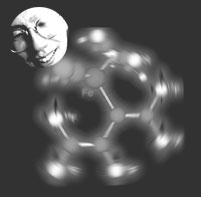Dedication
Introduction
Dan Ariely
Walter Bender
Steve Benton
Bruce Blumberg
V. Michael Bove, Jr.
Cynthia Breazeal
Ike Chuang
Chris Csikszentmihályi
Glorianna Davenport
Judith Donath
Neil Gershenfeld
Hiroshi Ishii
Joe Jacobson
Andy Lippman
Tod Machover
John Maeda
Scott Manalis
Marvin Minsky
William J. Mitchell
Seymour Papert
Joe Paradiso
Sandy Pentland
Rosalind Picard
Mitchel Resnick
Deb Roy
Chris Schmandt
Ted Selker
Barry Vercoe
Ike Chuang
My work lies at the junction of physics and computer science: two fields that have collided spectacularly in recent years, nowhere more vividly than with the birth of quantum computation and quantum information.
The fundamental quest of physics has traditionally been a search for universality: what is the smallest set of equations and constants from which everything in the universe can be derived? Our theories—from classical mechanics, to quantum physics—have encompassed phenomenal tracts of mankind's knowledge. But these theories have gaping holes: how, for example, do they explain laughter?
 Computer science is driven by a similar quest for universality, but unlike physics, it happily sacrifices microscopic dissimilarities in exchange for macroscopic similarities. The fundamental tenet is that any universal computational machine can efficiently simulate another. No physics is required: reality is mathematical! However, it now appears that it is impossible to abstract computation away from the physical world.
Computer science is driven by a similar quest for universality, but unlike physics, it happily sacrifices microscopic dissimilarities in exchange for macroscopic similarities. The fundamental tenet is that any universal computational machine can efficiently simulate another. No physics is required: reality is mathematical! However, it now appears that it is impossible to abstract computation away from the physical world.
All computers must obey the laws of physics, and quantum computers differ from the usual in that they cleverly exploit the laws of quantum mechanics, as well as those of mechanics and electromagnetism. I first encountered this idea in 1988, reading a marvelous paper by Richard Feynman, which pointed out that quantum mechanics cannot be efficiently simulated by classical machines. I was fascinated and decided to build a quantum computer. Fifteen years later, we now have simple quantum processors, and believe arbitrarily large and reliable quantum computers are possible. And quantum information, built on classical information theory, is now maturing into a global language for understanding and teaching quantum physics.
Still, there remains the mystery of laughter. Is there a lesson to be learned from the history of quantum information? Perhaps what we seek is not really a grand unified theory of physics, but something greater: a theory for laughter—and life itself.
First computer: IBM 370 punch-card system with COBOL